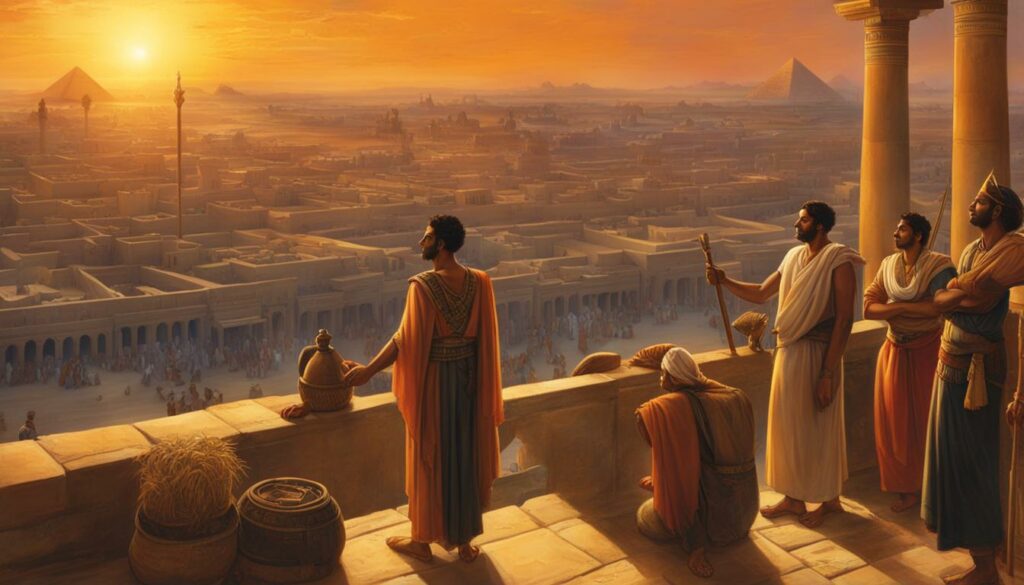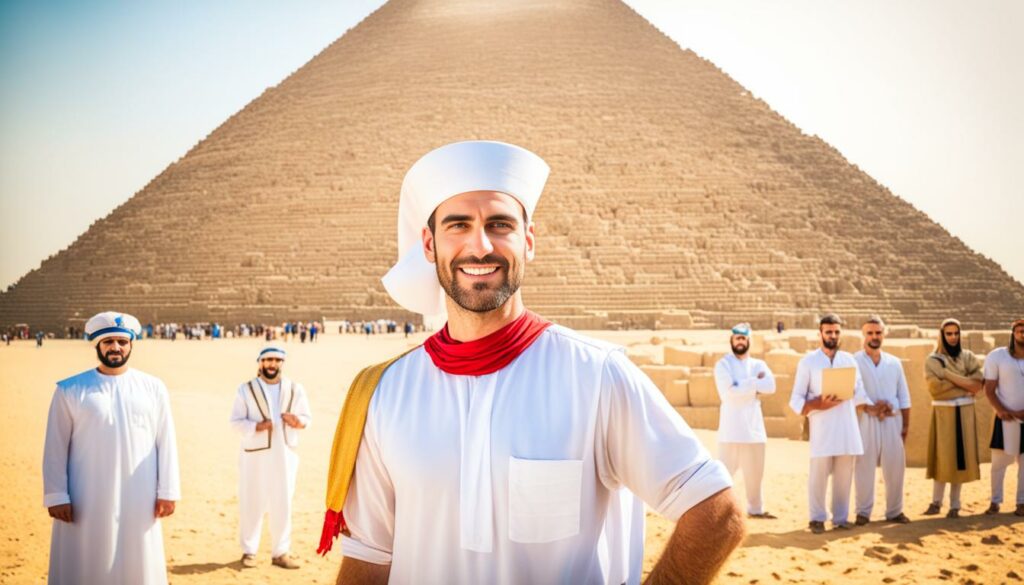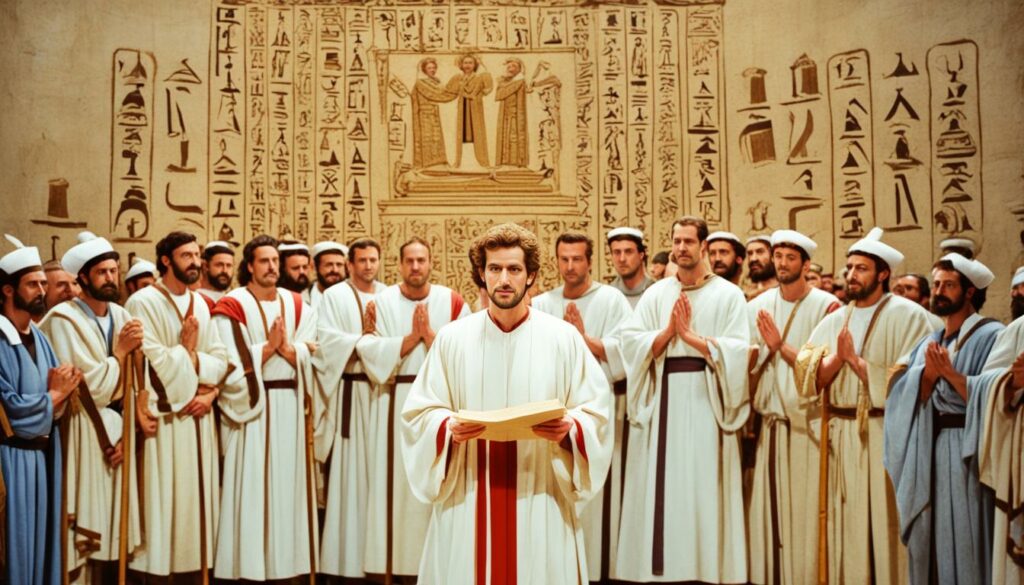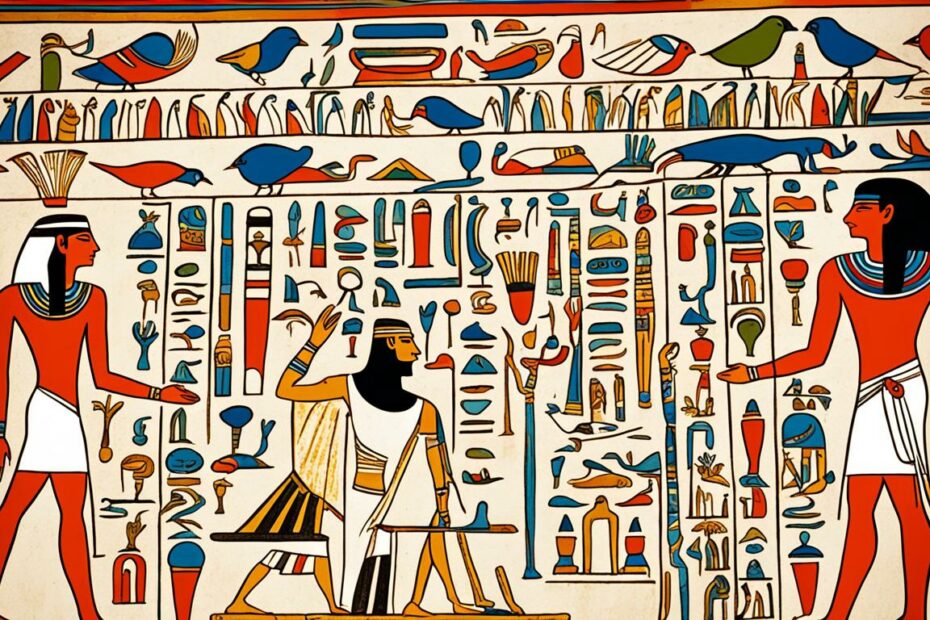Was Joseph real? Did he truly exist and play a significant role in ancient Egypt, as the Bible suggests? It may seem like a story straight out of a script, but there is compelling evidence that challenges common beliefs and supports the existence of Joseph in Egyptian history. From statues adorned with multicolored coats to grand palaces and tomb discoveries, explore the archaeological findings that shed light on Joseph’s presence in Egypt.
Joseph’s Rise to Power in Egypt
According to the Book of Genesis, Joseph’s journey in Egypt began when he was sold into slavery by his brothers. However, this turn of events proved to be the catalyst for Joseph’s remarkable rise to power. By utilizing his skills and talents, Joseph quickly made his way up the ranks of Egyptian society, eventually becoming the vizier, the second most powerful man in the kingdom.
In this influential position, Joseph played a pivotal role in implementing agricultural and taxation procedures that were crucial for Egypt’s survival during the seven years of famine. By devising efficient strategies and systems, Joseph ensured that Egypt had an abundance of food during times of plenty and was able to provide for its population, including his own family, when famine struck.
The historical evidence discovered, such as the grand palace and the presence of a high official actively involved in the governance of Egypt, aligns with Joseph’s elevated status and significant contributions to the state’s affairs. It is believed that Joseph’s exceptional leadership and expertise in managing agriculture and taxation earned him great respect and honor among the Egyptian people.
Joseph’s rise to power and his pivotal role in agriculture and taxation are testaments to his intelligence, ingenuity, and foresight. His ability to navigate challenging circumstances and provide for those under his care showcases his exceptional administrative skills and unwavering dedication to the well-being of the kingdom.

Joseph’s Integration into Egyptian Society
The story of Joseph in Egypt is not merely one of rise to power but also a tale of integration into Egyptian society. Historical evidence suggests that Joseph successfully assimilated into the culture, becoming a respected member of Egyptian society.
Archaeological findings have shed light on Joseph’s integration journey. The discovery of a Syrian-style house in Egypt, similar to the region from where Joseph’s great grandfather, Abraham, came, indicates a connection between Joseph’s heritage and his adaptation to the Egyptian way of life.
As time passed, this Syrian-style house was replaced by an Egyptian palace, indicating that Joseph’s influence and status had evolved. The palace’s grandeur and prominent location suggest that it belonged to a high-ranking official, possibly Joseph himself, who was highly regarded for his service to Egypt.

Another compelling piece of evidence is the presence of 12 main graves with memorial chapels in the palace’s garden. This aligns with the biblical account of Joseph and his 12 sons, reinforcing the narrative of his integration into Egyptian society.
This evidence paints a picture of Joseph not only achieving a position of power in Egypt but also fully immersing himself in the culture, traditions, and customs of the Egyptians.
Evidence of Joseph’s Integration into Egyptian Society
| Evidence | Description |
|---|---|
| Syrian-style House | Discovery of a Syrian-style house in Egypt, similar to Joseph’s ancestral region, indicating a connection between Joseph’s heritage and his integration into Egyptian society. |
| Egyptian Palace | Replacement of the Syrian-style house by an Egyptian palace, suggesting Joseph’s elevated status and high-ranking position in Egyptian society. |
| 12 Main Graves | Presence of 12 main graves with memorial chapels in the palace’s garden, mirroring the story of Joseph and his 12 sons, further supporting the narrative of his integration. |
This evidence not only reinforces the historical authenticity of Joseph’s existence in Egypt but also highlights his ability to adapt and become an esteemed member of Egyptian society. Joseph’s integration can be seen as a testament to his character and capabilities, showcasing his profound impact on both his homeland of Canaan and the land of Egypt.
Comparison to Egyptian Manners and Customs
By comparing the biblical account of Joseph’s life in Egypt to the customs and practices of the ancient Egyptians during the Middle Kingdom, we can uncover further evidence of Joseph’s existence and the historical accuracy of his story. The similarities between Joseph’s experiences and the known Egyptian customs of the time provide valuable insight into the cultural context and lend credibility to the biblical narrative.
One significant aspect to consider is the practice of giving foreign servants Egyptian names, which is mentioned in the biblical account. In the case of Joseph, Pharaoh gave him the name Zaphenath-paneah, which aligns with the Egyptian tradition of assigning new names to individuals who entered their service.
Joseph’s role as the Chief Steward of the King also reflects the established Egyptian administrative structure. The Chief Steward was responsible for overseeing various aspects of the kingdom’s affairs, including agricultural production and the management of grain storehouses. This aligns with known Egyptian practices, as agriculture and grain storage were vital for sustaining the kingdom during times of famine and ensuring the well-being of its people.
Furthermore, other customs mentioned in the biblical account, such as Joseph’s role in interpreting dreams and his act of shaving before entering Pharaoh’s presence, are consistent with the cultural norms of ancient Egypt. Dream interpretation held great significance in Egyptian society, with dreams considered as messages from the gods. Shaving before appearing in the presence of an important figure was also a common practice in order to maintain cleanliness and show respect.
Considering these various similarities between Joseph’s story and Egyptian customs, it becomes evident that the biblical account aligns with the culture and practices of ancient Egypt. This convergence strengthens the argument for Joseph’s existence and his significant role in Egyptian society during that time.
Comparison of Joseph’s Story to Egyptian Customs:
| Biblical Account | Egyptian Customs |
|---|---|
| Joseph given an Egyptian name by Pharaoh | Egyptians giving foreign servants new names |
| Joseph as Chief Steward of the King, overseeing agriculture and grain storage | Importance of agriculture and grain storage in Egyptian society |
| Joseph interpreting dreams | Significance of dream interpretation in Egyptian culture |
| Joseph shaving before entering Pharaoh’s presence | Cleanliness and respect customs in ancient Egypt |
Through a comparison of Joseph’s story to the customs and practices of ancient Egypt, we gain a deeper understanding of his experiences and the cultural context in which he lived. These similarities reinforce the authenticity of Joseph’s story and provide valuable insights into the historical accuracy of the biblical account.

Joseph’s Titles and Duties in Egypt
The biblical account of Joseph in Egypt mentions three significant titles that he held: Lord of Pharaoh’s House, Father to Pharaoh, and Ruler of all Egypt. These titles highlight the prominent roles and responsibilities Joseph held in the Egyptian government.
Chief Steward of the King – Lord of Pharaoh’s House
Joseph’s first title, Lord of Pharaoh’s House, aligns with the role of Chief Steward of the King. As Chief Steward, Joseph was entrusted with overseeing the King’s personal agricultural estates and the royal granaries. His duties included managing the agricultural production, ensuring the collection and storage of grain, and overseeing the distribution of food in times of plenty and scarcity.
Father to Pharaoh – Interpreter of Dreams
Joseph’s second title, Father to Pharaoh, likely denotes his exceptional ability to interpret dreams. The biblical account depicts Pharaoh having a perplexing dream that troubled him, and Joseph was summoned to decipher its meaning. His interpretation proved accurate, revealing a coming period of abundance followed by severe famine. Joseph’s counsel to store surplus grain during the years of plenty allowed Egypt to navigate the subsequent famine with preparedness and stability.
Ruler of all Egypt – Vizier of the Government
The title Ruler of all Egypt suggests that Joseph held the position of Vizier, the chief record-keeper and supervisor of the government. As Vizier, Joseph would have been responsible for maintaining administrative order, managing the bureaucracy, and executing royal decrees. This high-ranking position allowed him to wield considerable influence and authority in the affairs of Egypt.
While there may be ongoing debates among scholars regarding the precise nature of these titles, the archaeological and historical evidence points to Joseph occupying prominent positions within the Egyptian government.

Summary of Joseph’s Titles and Duties
| Title | Duties and Responsibilities |
|---|---|
| Lord of Pharaoh’s House | Overseeing the King’s personal agricultural estates and royal granaries |
| Father to Pharaoh | Interpreting dreams and guiding Egypt during times of abundance and famine |
| Ruler of all Egypt | Supervising the government as the Vizier and maintaining administrative order |
Impact and Lessons from Joseph’s Story
The story of Joseph in Egypt’s history carries a profound impact and imparts timeless lessons to individuals throughout generations. His remarkable rise to power and his unwavering determination to provide for his family during the famine serve as a testament to the power of resilience and the rewards of faithfulness.
Moreover, Joseph’s integration into Egyptian society is a powerful illustration of the possibility of cultural assimilation without losing one’s identity. His ability to adapt and thrive in a foreign land while remaining true to his values and principles is an inspiration for all who face the challenges of adapting to new environments.
Joseph’s journey also reinforces the importance of trust, even in the face of adversity. Despite the numerous trials and betrayals he encountered, Joseph consistently put his faith in God’s plan and ultimately found redemption and prosperity.
By examining the historical evidence of Joseph’s existence in Egypt, we not only gain valuable insights into the biblical account but also discover profound relevance in our own lives through the lessons learned from Joseph’s exemplary character. His story teaches us to have faith and trust in the midst of difficult circumstances and to recognize the guiding hand of providence in our own journeys.
FAQ
Q: Are there any archaeological findings that support the existence of Joseph in ancient Egypt?
A: Yes, there is compelling evidence that supports the existence of Joseph in ancient Egypt. For example, a statue of a “high official” decorated with a multicolored coat similar to the one described in the Bible was discovered in Goshen. Furthermore, the discovery of a grand palace and a statue with faint traces of colored stripes from a multicolored coat in the Nile Delta region adds further support to the biblical account of Joseph’s life in Egypt.
Q: What position did Joseph hold in Egypt?
A: According to the Book of Genesis, Joseph rose to become the vizier, the second most powerful man in Egypt. He used his position to implement agricultural and taxation procedures that allowed Egypt to survive seven years of famine. He was also honored for his contributions, further supporting his rise to power in Egypt.
Q: Did Joseph integrate into Egyptian society?
A: Yes, evidence suggests that Joseph integrated into Egyptian society. The discovery of a Syrian-style house in Egypt, later replaced by an Egyptian palace, indicates that Joseph became an integrated and respected member of Egyptian society. The presence of 12 main graves with memorial chapels in the palace’s garden also parallels the story of Joseph and his 12 sons.
Q: How does the biblical account of Joseph’s life in Egypt align with Egyptian customs and manners?
A: By comparing the biblical account to Egyptian customs from the Middle Kingdom, further evidence of Joseph’s existence emerges. For example, the biblical account mentions Joseph being given an Egyptian name by Pharaoh, which corresponds to the practice of giving foreign servants Egyptian names. Joseph’s responsibilities as Chief Steward of the King and his role in interpreting dreams align with known Egyptian practices of the time.
Q: What titles did Joseph hold in Egypt?
A: The biblical account mentions three titles held by Joseph in Egypt: Lord of Pharaoh’s House, Father to Pharaoh, and Ruler of all Egypt. These titles align with the role of Chief Steward of the King, an individual given a special honor for interpreting the King’s dream, and the position of Vizier, the chief record-keeper and supervisor of the government.
Q: What lessons can be learned from Joseph’s story in Egypt?
A: Joseph’s story holds significant impact and timeless lessons. It teaches us about the power of resilience and the rewards of faithfulness. His integration into Egyptian society demonstrates the possibility of cultural assimilation while maintaining one’s identity. The story also emphasizes the importance of trust, even in the face of adversity, and the providence of God in guiding individuals’ paths.
